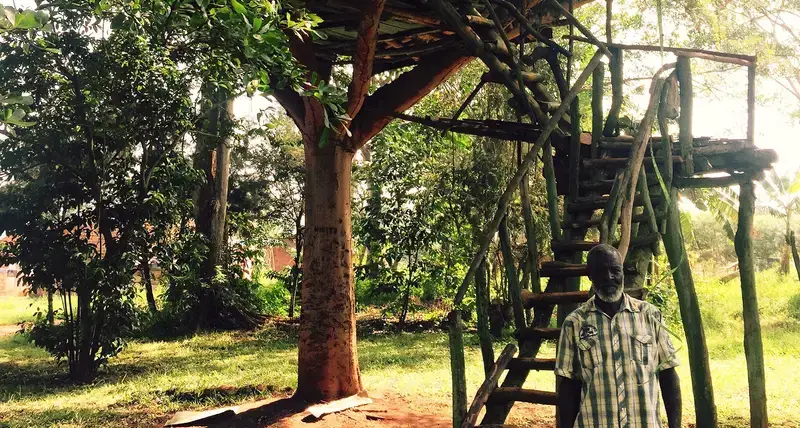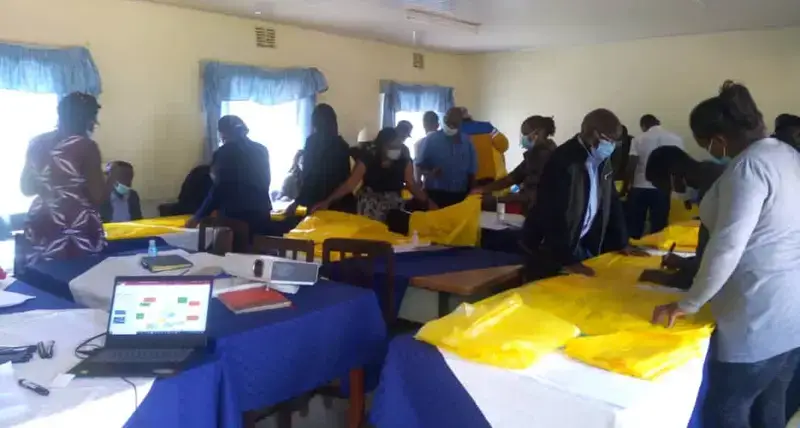UN Habitat is providing technical support to the Government of Uganda in Planned urbanization and human settlement development; Youth and vulnerable groups’ access to social-economic opportunities; Physical Infrastructure, Basic services and Urban Economy; Housing and Slum Upgrading; Management of Land and Urban Environment; Governance and Capacity Building and the Greater Kampala Metropolitan Area Development.
Impact
Urban numbers
Challenges
7,993,711 (17.5 %) of the total population in Uganda is urban, growing at a very high rate of 5.2%. The challenges related to these rapid urbanization include uncoordinated planning and development leading to uncontrolled sprawling of the major towns; youth bulge in urban areas; growth of slums and informal settlements, dilapidated housing, and poor sanitation; privatization of urban development without providing public space and connectivity; weaknesses in administration, institutions, legal normative framework and overall planning; and weak coverage of basic infrastructure services, notably
water, energy, and sanitation, which makes it difficult to improve welfare in either urban or rural environments
Donors and partners
The success of our work in Kenya is dependent on successful partnerships. Overall, the Uganda Habitat Country Programme Document (HCPD 2016-2021) has been developed and is being implemented through a collaboration involving the national and municipalities, The Kampala Capital City Authority (KCCA), World Bank and academia.
Donors
Contact
Legacy content
- Total value of UN-Habitat investments (2008-2015): US$ 31,322,045
- Total number of UN-Habitat projects (2008-2015): 8 projects
- Main donors: Netherlands, USAID, UNDP Uganda, UNEP/GEF Secretariat – Kenya, UNFPA, UNEP/GEF Secretariat – Kenya, African Development Bank, European Commission and, the Africa, Caribbean and Pacific Secretariat
- Implementing partners: FAO, ILO, UNFPA, UNIFEM, UNDP, UNEP/GEF, UNEP/DTIE, ITDP, TRL, UITP, GTZ, World Bank, AFD, UNFPA
General information
Capital: Kampala
Major cities: Kampala, Gulu, Lira, Mbarara, Jinja, Bwizibwera, Entebbe
- Population: 36.35 Million
- GDP: US$19.88 Billion
- GDP growth: 3.4%
- Urban population (annual %): 16%
- Population growth rate (average annual %): 3.4%
- Urban population growth rate (average annual %): 6.0%
- Rural population growth rate (average annual %): 2.9%
Source: World Bank 2012
UN-Habitat projects in Uganda
Lake Victoria Region Water and Sanitation Initiative PHASE II - Training and Capacity Building Component
Objective of the project
- To provide efficient and timely implementation of programme activities
- To enhance community participation in ownership of programme activities, thereby empowering them for sustainability of the programme facilities and outcome/benefits
- To ensure the financial and operational sustainability of the programme investments
- To ensure that the poverty reduction and public health benefits of the programme are fully realized
Methodology
The project is developed around the following methodologies:
- Programme management to ensure local stakeholder participation, timely and efficient delivery of programme outputs and an effective monitoring, quality assurance and evaluation system.
- Institutional capacity of service providers to ensure the efficient delivery of water, sanitation and refuse collection and disposal services and the long term sustainability of programme investments.
- Hygiene promotion and sanitation to maximize the public health benefits of the programme, strengthen local structures to manage public sanitation programmes and promote options for financing mechanisms for accessing to household sanitation.
- Urban catchment management to reduce environmental degradation and contribute to the long term sustainability of water resources.
- Monitoring and evaluation system to ensure gender mainstreaming in water and sanitation programmes and provision of services to the poor.
Service sectors covered by the project include:Water, Sanitation, Solid Waste management, and Environment.
- Duration:April 2011 to December 2016
- Value: USD 4,244,443
- Donor:African Development Bank
- Implementing Partners:UN-Habitat, East Africa Community through the Lake Victoria Basin Commission (LVBC), Governments of Uganda, Burundi, Kenya, Tanzania and Rwanda through respective ministries.
Promoting Sustainable Transport Solutions for East African Cities (GEF-SUSTRAN)
Objective of the project: The project “Promoting Sustainable Transport Solutions for East African Cities” aims to reduce growth in private motorized vehicles, thus reducing traffic congestion and greenhouse gas emissions in the three capital cities of Ethiopia, Uganda, and Kenya.
The overall goal of this project is to create the technical and institutional basis for implementing sustainable metropolitan transport networks and systems and establish a demonstration corridor for sustainable urban mobility. The project is expected to support the governments in providing safe, efficient, and equitable transport to all residents, rich and poor.
Service sectors covered by the project include:Transport,Planning ,Energy, and Legislation.
The methodology: The envisaged strategic response is to upgrade the public transport systems, implement improved non-motorized transport infrastructure (such as bicycle lanes and walkways) and apply travel demand management (e.g. parking reform) as well as spatial development strategies to reduce travel.
Starting with small steps in each city seems to be the most feasible approach. It is therefore the aim of this project to also support each government in establishing a first sustainable transport corridor, which can serve as a demonstration example and act as a catalyst towards expanding the proposed networks and measures throughout each city.
- Duration:October 2010 to December 2016
- Value: USD 7,335,000
- Global Environment Facility (GEF) - USD 3,000,000;
- Co-financing (UN-Habitat, UNEP, ITDP, World Bank Kampala - USD 3,485,000;
- In kind (UN-Habitat, UNEP, ITDP, GTZ, TRL) - USD 850,000
- Donor:Global Environment Facility (GEF)
- Implementing Partners:UN-Habitat, UNEP, Governments of Uganda, Ethiopia, Kenya, through respective ministries. Institute for Transport and Development Policy (ITDP), Transport Research Laboratory (TRL), German Organisation for International Cooperation (GIZ), First African Bicycle Information Organisation (FABIO), Kampala Capital City Authority (KCCA)
Promoting Energy Efficiency in Building in Eastern Africa
Objective of the project
The project seeks to mainstream energy efficiency into the existing legislation; and, to build on ongoing initiatives and develop an energy efficiency regulatory system for new and existing buildings. The project will also focus on green architecture, with the emphasis on effective policies, regulations and standards that integrate energy efficiency into building design.
Service sectors covered by the project include: energy access, buildings, academia, policy and legislation, housing finance.
The methodology: The project is developed around the following methodologies: Establishment of a benchmarking on energy use in building, capacity building of practitioners and professionals of the building industry; review of the building regulations and standards; development of tools and establishment of financial mechanism for promotion sustainable building design. Working with the national and local governments as well as training institutions and the private sector.
- Duration:August 2011 to December 2016
- Value: USD 15,276,288(Global Environment Facilities (GEF) USD 2,793,000; UN-Habitat (in kind) USD 400,000; Governments (in kind) USD 12,083,288)
- Donor: Global Environment Facilities, and UN-Habitat,
- Implementing Partners:UN-Habitat, UNEP and Governments of Uganda, Tanzania, Kenya, Burundi and Rwanda through respective ministries.
Water and Sanitation Programme - Lake Victoria Region WS Initiative
The UN-HABITAT Water and Sanitation Trust Fund aims to create an enabling environment for pro-poor investment in water and sanitation in urban areas of all sizes in the developing world, thus providing a vehicle to significantly improve the volume and effectiveness of both the Official Development Assistance and national financial flows into the water and sanitation sector.
- Duration: December 2005 - December 2012
- Value: US$ 20,719,970
- Donor: Netherlands
- Location: Regional project for Kenya, Tanzania, Uganda
Coordination and Support to IDP Camp Management in Northern Uganda
- Duration: August 2006 - December 2008
- Value: US$ 200,000
- Donor: USAID
- Implementing partners: FAO, ILO, UNFPA and UNDP
- Location: Acholiland, Teso, Lango sub-regions
UN Joint Programme on Gender Equality in Uganda
To facilitate sustainable return and resettlement through reliable provision of basic services such as safety and security and civilian access to justice in areas of return and resettlement
- Duration: July 2010 - December 2012
- Value: US$ 74,900
- Donor: UNDP Uganda
- Implementing partners: UNIFEM, UNDP
- Location: Lira & Kitgum municipalities
Promoting Sustainable Transport Solutions for East African Cities
To create the technical and institutional basis for implementing metropolitan sustainable transport networks and systems and establish a demonstration corridor for sustainable mobility.
- Duration: January 2011 - December 2015
- Value: US$ 2,850,000
- Donor: UNEP/GEF Secretariat - Kenya
- Implementing partners: UNEP/GEF, UNEP/DTIE, ITDP, TRL, UITP, GTZ, WORLD BANK, AFD
- Location: Kampala
Empowerment of Vulnerable Urban Youth for Socio-Economic Inclusion
The development goal of the project is to enhance the capacity of the Government of Uganda; the municipality council of Arua to empower vulnerable urban youth for socio-economic inclusion and development.To establish a One Stop Youth Centre (OSYC) in Arua Municipality that will enhance the capacity of youth and youth organizations to acquire and promote entrepreneurship skills for income generation. To strengthen the capacity of the Arua municipality to undertake youth development activities.
- Duration: March 2011 - December 2012
- Value: US$ 284,730
- Donor: UNFPA
- Implementing partners: UNFPA
- Location: Arua
Promoting Energy Efficiency in Buildings in East Africa (PrEEBEA)
To mainstream energy efficiency measures into housing policies, building codes, municipal by-laws and building practices in East Africa (Kenya, Tanzania, Uganda, Rwanda and Burundi) in order to achieve considerable avoidance of HG emissions as a result of improved buildings and building practices; leading to more efficient use of electricity and thus to expand the electricity supply to satisfy the increasing demand by both residential and economic productive activities of the partner countries.
- Duration: August 2011 - December 2015
- Value: US$ 2,793,000
- Donor: UNEP/GEF Secretariat - Kenya
- Implementing partners: UNEP and GEF
- Location: Regional Project in Burundi, Kenya, Rwanda, Tanzania, Uganda
Water and Sanitation Trust Fund
Implementation of Training and Capacity Building Activities Under the Lake Victoria Water Supply and Sanitation Programme Phase II
- Duration: December 2011 - December 2016
- Value: US$ 4,244,445
- Donor: African Development Bank
- Location: Regional project for Kenya, Tanzania, Uganda (Lake Victoria Region)
Participatory Slum Upgrading Programme
The Participatory Slum Upgrading Programme is being implemented in Uganda in partnership with the Ministry of Land, Housing and Urban Development (MoLHUD) with a view of mobilising various stakeholders into review, adopt and develop enabling policy and institutional capacity to facilitate adoption of slum upgrading and prevention strategies to contribute to improving of living conditions of slum dwellers in Namibian towns and cities. The implementation of Phase 2 in Namibia will strengthen community, city and national key stakeholders' capacities in participatory slum upgrading in Namibia, particularly in the selected cities/towns of Mbale, Kitgum and Mbarara thus adding value to the development of policy, institutional, legislative, and financial frameworks.
- Implementation Phase: Phase II
- Duration: 2008 – December 2015
- Value: US$155,000
- Donor: European Commission and, the Africa, Caribbean and Pacific Secretariat
- Implementing Partners: UN-Habitat and Ministry of Lands, Housing and Urban Development
- Profile cities/ location: Mbale, Mbarara and Kitgum


